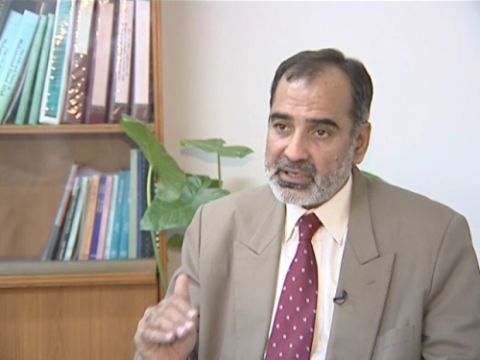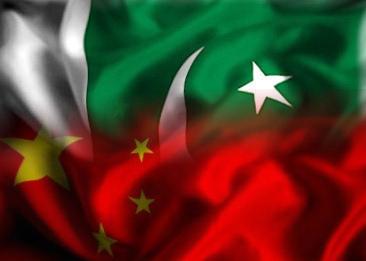اُڑمچی میں پاک چین تعلقات پر کانفرنس
حال میں چین اور پاکستان کی قیادت کے درمیان ہونے والے اعلیٰ سطحی مذاکرات کے نتیجے میں نئے جذبے سے قائم ہونے والی نئی ٹھوس بنیادوں پر پاک چین تعلقات کو مزید مضبوط کرنے اور ان میں مزید استحکام لانے کی ضرورت ہے جبکہ اس تمام مرحلے میں علاقائی مسائل کے حل کے لیے باہم مرتب کردہ مشترکہ حکمت عملی پر خصوصی نگاہ رکھنا ہوگی۔
ان خیالات کا اظہار ۱۱ جولائی ۲۰۱۳ء کوچین کے شہر اُڑمچی میں ہونے والی سالانہ مشترکہ چار اداراتی کانفرنس کے موقع پر مقررین نے کیا۔
یہ کانفرنس انسٹی ٹیوٹ آف سنٹرل ایشین اسٹڈیز(ICAS)اُڑمچی میں منعقد ہوئی۔ اس کانفرنس کے انعقاد میں دیگر شراکت دار اداروں میں انسٹی ٹیوٹ آف پالیسی اسٹڈیز (IPS)اسلام آباد، انسٹی ٹیوٹ آف ساؤتھ ایشین اسٹڈیز (ISAS)چیندو اور انسٹی ٹیوٹ آف ساؤتھ ایشین اسٹڈیز (ISAS) کن منگ شامل تھے۔
آئی پی ایس سے جس تین رکنی وفد نے اس کانفرنس میں شرکت کی ان میں آئی پی ایس کے ڈائریکٹرجنرل خالدرحمن، یونیورسٹی آف مینجمنٹ اینڈ ٹیکنالوجی (UMT)میں سماجی علوم کے سربراہ پروفیسر عبدالحمید اور آئی پی ایس کے لیڈ کو آرڈی نیٹر عرفان شہزاد شامل تھے۔

خالد رحمن کی تقریر کا عنوان تھا ’’پاک چین تعلقات: ابھرتا علاقائی منظرنامہ اور مستقبل کی سمت‘‘۔ انہوں نے زور دیتے ہوئے کہا کہ افغانستان سے نیٹو اور امریکی افواج کی۲۰۱۴ء کے اختتام تک متوقع واپسی کے باعث جونیا علاقائی منظرنامہ ابھرے گا اس کے دُور رس اثرات اس سارے خطے کے استحکام اور پاک چین دوستی پربھی مرتب ہوں گے۔ جہاں انخلا کے مبہم منصوبوں اور ان پر غیر یقینی عملدرآمد کے ساتھ ساتھ امریکہ، طالبان اور افغان حکومت کے درمیان مذاکرات کے عمل میں اتارچڑھاؤ کے نتیجے میں افغانستان کا مستقبل ایک غیر یقینی صورت حال سے دو چار ہے وہاں امریکہ کی طرف سے براعظم ایشیا میں قائدانہ کردار بھارت کو تفویض کیا جارہا ہے جس میں بحرہند میں فوجی نقل و حمل بھی شامل ہے۔ چنانچہ یہ صورتِ حال بحری جہازوں کی نقل و حمل، تجارت اور توانائی کی فراہمی کے ضمن میں بالکل نئی نوعیت کے چیلنج سامنے لانے والی ہے۔
کانفرنس کا آغازICAS اُڑمچی کے سرپرست ادارے، سنکیانگ اکیڈمی آف سوشل سائنسز کے صدر پروفیسر لیوزونگ کانگ کے افتتاحی خطاب سے ہُوا۔ انہوں نے اپنی تقریر میں سنکیانگ اور پاکستان کے درمیان اس مذہبی و ثقافتی مماثلت پر روشنی ڈالی جو تعاون کے لیے مضبوط بندھن اور بنیاد فراہم کرتا ہے۔ جنوبی ایشیااورپاکستان کے اُمور پر نظر رکھنے والے نمائندہ چینی دانشوروں نے اس کانفرنس میں شرکت کی اور اپنے خیالات کا اظہار کیا۔
ISASچیندو کے سابق ڈائریکٹر پروفیسر وین فودے نے پاکستان اور چین کے درمیان اقتصادی تعلقات میں تجارتی عدم توازن کو کم کرنے پر زور دیا انہوں نے تجویز کیا کہ ملک میں پیداواری صلاحیت میں اضافہ کیا جانا چاہیے تاکہ چین میں پاکستان سے برآمد کے زیادہ سے زیادہ مواقع پید اہوسکیں۔ پاکستان اسٹڈی سنٹر چیندو کے ڈائریکٹر پروفیسر چن جی ڈونگ کی رائے تھی کہ حال ہی میں سامنے آنے والی پیش رفت مثلاً اقتصادی کوریڈور کے اعلان کے بعد دوطرفہ تعاون کی شکل تبدیل ہوجائے گی اور سنکیانگ، پاکستان اور ہمسایہ ممالک ترقی کے ایک نئے دور میں داخل ہوجائیں گے۔ ISASکی ڈائریکٹر محترمہ لی تاؤ نے تمام شعبوں میں تعاون کے لیے اداراتی نظام وضع کرنے کا مشورہ دیا۔ ISASکن منگ کے ڈائریکٹر پروفیسر چن لی جُن نے اپنی پریزینٹیشن کو دونوں ممالک کے درمیان اقتصادی اور توانائی کے تعاون پر مرکوز رکھا۔ ICASاُڑمچی کی قائم مقام ڈائریکٹرمحترمہ شی لین نے کانفرنس میں سیکرٹری کے فرائض سرانجام دیے۔

افغانستان میں تبدیل ہوتی ہوئی صورتِ حال، امریکی اور نیٹو افواج کے انخلاء کا منظرنامہ، طالبان اور امریکہ کے درمیان مذاکرات اور افغانستان میں جاری مصالحتی عمل کی بازگشت کانفرنس کے دوران بار بارسنائی دیتی رہی۔ اس بات پر زور دیا گیا کہ افغانستان کے حوالہ سے دونوں ملکوں کو چاہیے کہ ایسے اقدامات کو آگے بڑھائیں جو خالصتاً مقامی اور علاقائی سطح پر اٹھائے گئے ہوں اور افغانوں کی زیر قیادت مفاہمتی اقدامات کی مکمل طور پر حمایت کریں۔ چائنا ویسٹ نارمل یونیورسٹی (CWNU)میں نئے قائم شدہ پاکستان اسٹڈی سنٹر کے سربراہ پروفیسر لی جیان اور ISASچیندو کے زینگ زیانگ یونے افغانستان کی پریشان کن صورتِ حال اور پاک چین تعلقات سمیت علاقے میں اس کے ممکنہ اثرات پر روشنی ڈالی ۔
کانفرنس میں آئی پی ایس کے سینئر ایسوسی ایٹ کی حیثیت سے حصہ لینے والے UMTلاہور کے پروفیسر عبدالحمید نے اعلیٰ تعلیم، ٹیکنیکل اور پیشہ ورانہ تربیت، انسانی وسائل کی ترقی اور تحقیق کے میدان میں تعاون جیسے امور پر دونوں ملکوں کے درمیان تعلیم کے میدان میں تعاون کے امکانات پرروشنی ڈالی۔ انہوں نے دونوں ممالک کی یونیورسٹیوں کے درمیان تربیتی روابط کی ضرورت پر زور دیتے ہوئے کہا کہ اس ضمن میں طلبہ اور اساتذہ کے تبادلے اور زبانوں بالخصوص پاکستان میں چینی زبان کے فروغ میں درکار تربیتی پہلو مد نظررکھے جانے چاہییں۔
آئی پی ایس کے لیڈ کو آرڈی نیٹر عرفان شہزاد نے جو پریز ینٹیشن پیش کی اس کا عنوان تھا ’’پاک چین اقتصادی تعلقات: مستقبل کی تیاری‘‘۔ اس میں اقتصادی کور یڈور کو ایک پلان سے پراجیکٹ میں تبدیل کرنے کی ضرورت کو اجاگر کیا گیا۔ اسی طرح پاکستان میں چین کی سرمایہ کاری کا حجم بڑھانے کے ساتھ پاکستانی برآمد کنند گان کو اس طرح کی ٹیکس سہولتیں فراہم کرنے کی ضرورت پر زور دیا گیا جیسا کہ چینی مارکیٹوں میں دیگر آسیان ممالک کے برآمد کنند گان کو حاصل ہیں۔ انہوں نے تجویز دی کہ کاروباری جھگڑوں کو ختم کرنے کے لیے کوئی طریقہ کار وضع کیا جائے اور اس امکان پر غور کیا جائے کہ کاشغر اقتصادی زون کو گلگت بلتستان تک پھیلایا جائے۔
چاروں اداروں نے ایک مفاہمتی یادداشت پر بھی دستخط کیے جس کا مقصد مستقبل میں چاروں اداروں کے درمیان علمی تعاون کا فروغ ہے۔
نوعیت: روداد کانفرنس
تاریخ: ۱۱ جولائی ۲۰۱۳ء









جواب دیں